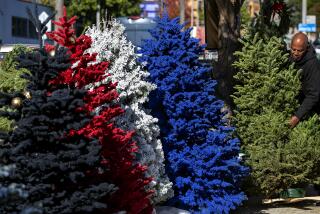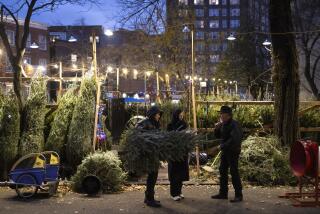Fresh or Plastic Christmas Trees? A Question for the Environment
TRAVERSE CITY, Mich. — Christmas tree growers are trying to capitalize on America’s new-found environmental awareness, touting their evergreens as the responsible alternative to plastic “petrochemical trees.”
“Real trees are recyclable; they’re biodegradable,” said Jeanne Weiss, assistant director of public relations for the National Christmas Tree Assn.
Plastic trees “are made out of oil byproducts,” Weiss said last week.
On the other hand, some environmentalists point out that chemicals often are used on real trees, and that plastic trees are reusable.
Artificial trees for several years have held a steady 50% share of the holiday market. Even so, Weiss predicts that shoppers will buy 36 million cut Christmas trees this season--a $341-million business for wholesalers.
Michigan, the nation’s largest commercial tree producer, will cut about 7 million trees this year.
In 1988, the national Christmas tree growers group put $1 million into a television advertising campaign playing on the nostalgic charm of cut trees. This year, Weiss said, “with all that publicity about Earth Day, we thought that should carry over to Christmas.”
The group has an armory of tree trivia for its campaign:
--For every Christmas tree cut, three are planted, most on land where other crops fail.
--Most trees sold in the United States are grown here.
--The nation’s approximately 1 million acres of Christmas trees supply enough oxygen for 18 million people. Those trees also absorb carbon dioxide, one of the gases warming the Earth through the greenhouse effect.
But a real Christmas tree does not necessarily mean an environmentally safe tree, said Jane Elder, Midwest representative for the Sierra Club in Madison, Wis.
She said Christmas tree buyers should be aware that most live trees are sprayed with a variety of chemicals, even paint.
“There are questions they should ask: Was it grown with herbicides or pesticides or sprayed with dyes or other chemical additives that will add to the pollution stream? . . . You get into the question of is it worth it for a tree that is just slightly more emerald green,” she said.
Buyers should also consider how they will dispose of the tree.
“If you are going to buy a petrochemical Christmas tree and keep it for your lifetime and pass it down to your grandchildren, then I suppose that, too, is environmentally sound,” Elder said.
Pesticides and other chemicals are as much a part of the Christmas tree industry as other agricultural products, said Michael Gabrione of M. Walter Christmas Trees Inc., in Chicago. “If we have to have totally organic Christmas trees, everybody in the Christmas tree industry is going to be in big trouble,” Gabrione said. “People aren’t going to get the same kind of product they are used to.”
Walter Christmas Trees follows industry practice and paints its Scotch pines green. Otherwise, the trees would have a yellowish cast Gabrione said.
More to Read
Inside the business of entertainment
The Wide Shot brings you news, analysis and insights on everything from streaming wars to production — and what it all means for the future.
You may occasionally receive promotional content from the Los Angeles Times.










